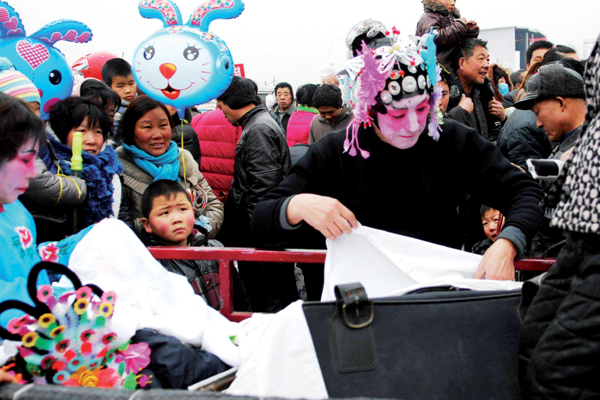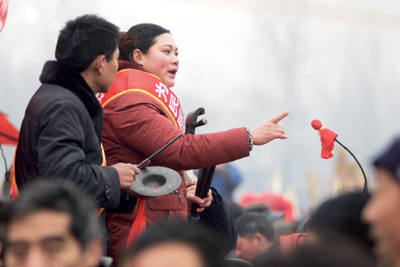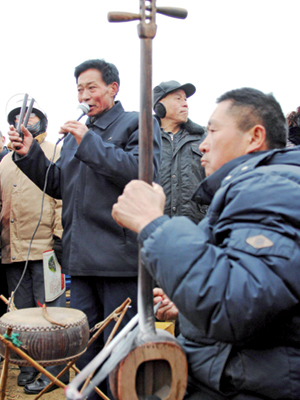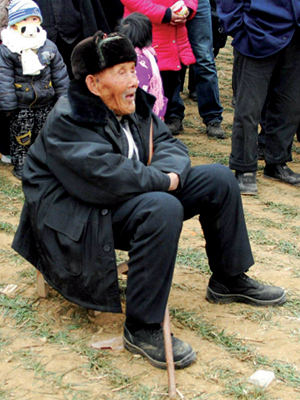Field of dreams
Updated: 2012-02-29 10:33
By An Baijie and Xiang Mingchao (China Daily)
|
|||||||||||
 |
|
A performer prepares before stepping onto the stage at the Majie Folk Art Fair. Photos by Xiang Mingchao / China Daily |

 |
|
Above and below: Folk artists from around the country demonstrate their skills at the annual folk art fair in Majie, Henan province. |
For 700 years, folk artists from around the country have flocked to a village in Henan to perform in the open air. But the youth's mindset might silence this age-old tradition. An Baijie and Xiang Mingchao report.
Dozens of opera fans surround Chen Yi as the 15-year-old performs arias in a rye field in rural Henan province. While Chen is a teenager, most of the other attendees of the annual Majie Folk Art Fair, which has been staged for more than 700 years, are middle-aged or elderly.
The event, staged on the 13th day of the first lunar month (Feb 4 this year), is a carnival for folk artists from across the country, who flock to Majie village's grain fields to demonstrate their skills.
Chen, who performed on the quhu (a two-stringed traditional fiddle), was among the youngest attendees. Some audience members started singing along as he played.
At one point, a woman in her 60s calls to him: "Young boy, please perform Blind Man Watch the Lantern (a local Quju Opera) with me."
He obliges.
 |
|
An elderly villager enjoys a performance. |
Someone asks Chen if the woman is from his troupe, to which he responds: "We're total strangers. People just sing whenever they want at this fair."
Chen says he once played more than 50 Quju Opera arias for five hours without a break because so many participants wanted to sing along with him. He had to constantly rub his hands together because the field was so cold.
More than 200,000 people, including 1,800 folk artists, attended this year's fair, a Baofeng county government spokesperson says.
Folk artists crooned ballads to the accompaniment of musical instruments or bamboo clappers on hilltops, grain fields and riverbanks.
Some villagers invite the artists to their homes to celebrate harvests or entertain guests at weddings and birthdays.
Villagers and performers negotiate a fee, ranging from a few hundred to several thousand yuan, depending on the artists' skill and reputation.
Representatives of many schools of storytelling and ballad performance present their repertoires. But most artists come from the Henan Zhuizi storytelling school. Narratives focus on ancient legends, heroes, virtuous women and patriots.
Many stories have been innovated upon to reflect modern life.
Lu Huarang, a 45-year-old farmer from Pingdingshan county, who has attended the fair for about three decades, performed a Henan Zhuizi ballad to promote family-planning policies.
"The folk story I just performed was named The Sadness of Having too Many Sons, which describes an old man who has five sons but none of them offered help when he met difficulties," she says.
"It's an innovation on the genre to advocate the country's policies through Henan Zhuizi Opera."
Yang Jiafu, a 64-year-old Pingdingshan city resident who came to the fair with his son, says watching operas in the field is more invigorating than to watch them on TV.
"It's a pity the fair is only once a year," Yang says.
"There should be more fairs like this."
The Majie Folk Art Fair was listed among China's intangible cultural heritage items by the State Council in 2005.
The fair's origins come from Majie's location at the gateway between the mountains and plains.
The village was a major point of passage for caravans and traveling folk artists in ancient China. Folk artists passing through staged performances on holidays and celebrations. Over time, the village became the place where artists from around the county come to ply their trades during the Lunar New Year. It's an opportunity for folk performers with few income opportunities to thicken their wallets.
Shang Jianshe, a 54-year-old folk artist from Lankao county, who has been attending the fair since he was 9 years old, says he can earn up to 2,500 yuan during the fair.
"I can support my 80-year-old mother and myself with that," he says.
"It's a pity there are so few fairs."
But the younger generation's mindset might mean the end of this age-old tradition.
Lu He, a 24-year-old student of Beijing's Communication University of China, believes protecting folk art is important but she wouldn't want to learn how to perform them.
"I came because I majored in folk opera," she says.
"But we young people face many practical pressures. Learning folk arts won't bring me a house or a car."
Today's Top News
Rescuers race against time for quake victims
Telecom workers restore links
Coal mine blast kills 18 in Jilin
Intl scholarship puts China on the map
More bird flu patients discharged
Gold loses sheen, but still a safe bet
US 'turns blind eye to human rights'
Telecom workers restore links
Hot Topics
Lunar probe , China growth forecasts, Emission rules get tougher, China seen through 'colored lens', International board,
Editor's Picks

|

|

|

|

|

|





